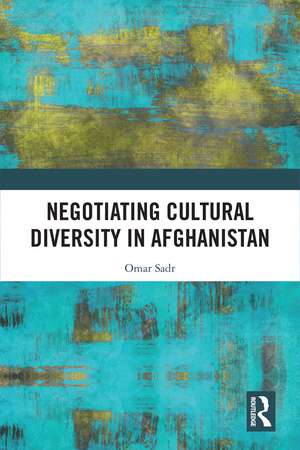Negotiating Cultural Diversity in Afghanistan
Autor Omar Sadren Limba Engleză Hardback – 20 ian 2020
A major intervention in understanding a war-torn country through an insider account, this book will be of great interest to scholars and researchers of politics and international relations, especially those concerned with multiculturalism, state-building, nationalism, and liberalism, as well as those in cultural studies, history, Afghanistan studies, South Asian studies, Middle East studies, minority studies, and to policymakers.
| Toate formatele și edițiile | Preț | Express |
|---|---|---|
| Paperback (1) | 386.00 lei 6-8 săpt. | |
| Taylor & Francis – 30 sep 2021 | 386.00 lei 6-8 săpt. | |
| Hardback (1) | 1004.68 lei 6-8 săpt. | |
| Taylor & Francis – 20 ian 2020 | 1004.68 lei 6-8 săpt. |
Preț: 1004.68 lei
Preț vechi: 1225.22 lei
-18% Nou
Puncte Express: 1507
Preț estimativ în valută:
192.25€ • 201.13$ • 159.70£
192.25€ • 201.13$ • 159.70£
Carte tipărită la comandă
Livrare economică 02-16 aprilie
Preluare comenzi: 021 569.72.76
Specificații
ISBN-13: 9781138371057
ISBN-10: 113837105X
Pagini: 256
Ilustrații: 12
Dimensiuni: 156 x 234 x 16 mm
Greutate: 0.58 kg
Ediția:1
Editura: Taylor & Francis
Colecția Routledge India
Locul publicării:Oxford, United Kingdom
ISBN-10: 113837105X
Pagini: 256
Ilustrații: 12
Dimensiuni: 156 x 234 x 16 mm
Greutate: 0.58 kg
Ediția:1
Editura: Taylor & Francis
Colecția Routledge India
Locul publicării:Oxford, United Kingdom
Public țintă
PostgraduateCuprins
1. Introduction 2. Cultural Diversity and the State 3. Afghan Nationalism and its Discontents 4. Modes of Cultural Integration and Homogenisation in Afghanistan 5. The Problematique of Governance of Cultural Diversity 6. Intercultural Dialogue in a Fragile Society 7. Role of External Actors in Afghanistan (1992–2014) 8. Conclusion
Notă biografică
Omar Sadr is Assistant Professor at American University of Afghanistan (AUAF), Kabul, Afghanistan. Previously, he worked at the Afghan Institute for Strategic Studies (AISS) and National Centre for Policy Research (NCPR), Kabul University. His primary research interests are in the intersection of culture and politics. He earned a doctorate from South Asian University, New Delhi, India. His recent publications include "Political Settlement of Afghanistan Conflict" (2019); "The Fallacy of Afghanistan’s Peace Process: A People’s Perspectives" (2018); "Mahmud Tarzi: Intellectual and Reformist," in Dev N. Pathak and Sanjeev Kumar H.M. (eds), Modern South Asian Thinkers (2018); "Afghanistan: The Vulnerabilities of Minorities," in Sajjad Hassan (ed.), South Asia State of Minorities Report 2016: Mapping the Terrain (2016); and "Rethinking Stability for Afghanistan: Socializing Great Powers in a Multilateral Order," in Rajen Harshe and Dhananjay Tripathi (eds), Afghanistan Post-2014: Power Configurations and Evaluating Trajectories (2015).
Recenzii
‘Omar Sadr attempts a well-founded analysis of the identity politics in Afghanistan. His central argument — that for democracy to be a successful project, it must be grounded in the representation of cultural diversity — is pertinent to contemporary Afghanistan. Sadr’s contribution to the discourse on multiculturalism addresses a crucial gap in the literature on Afghanistan, making it significant for its academic worth and its relevance to policy.’
Jayashree Vivekanandan, Department of International Relations, South Asian University, New Delhi, India
‘Drawing on contemporary normative literature, both from political theory and international relations, Omar Sadr makes a compelling case for preserving cultural diversity in Afghanistan. This work is laudable and well-timed, considering a growing perception that multiculturalism is on the wane globally. I am sure Sadr’s work will immensely profit scholars across disciplines and especially those keen to learn from a transnational mapping of multicultural theory and practice beyond the intellectual comfort zone of Western constructs.’
Ashok Acharya, Professor, Department of Political Science, University of Delhi, India
Jayashree Vivekanandan, Department of International Relations, South Asian University, New Delhi, India
‘Drawing on contemporary normative literature, both from political theory and international relations, Omar Sadr makes a compelling case for preserving cultural diversity in Afghanistan. This work is laudable and well-timed, considering a growing perception that multiculturalism is on the wane globally. I am sure Sadr’s work will immensely profit scholars across disciplines and especially those keen to learn from a transnational mapping of multicultural theory and practice beyond the intellectual comfort zone of Western constructs.’
Ashok Acharya, Professor, Department of Political Science, University of Delhi, India
Descriere
This book analyses multiculturalism and state-building in contemporary Afghanistan. It explores how modern state construction in twentieth-century Afghanistan led to forced assimilation, expulsion and multiple forms of discriminations and how Afghan nationalism was manufactured as an ideology to reinforce the process of Afghanisation.
